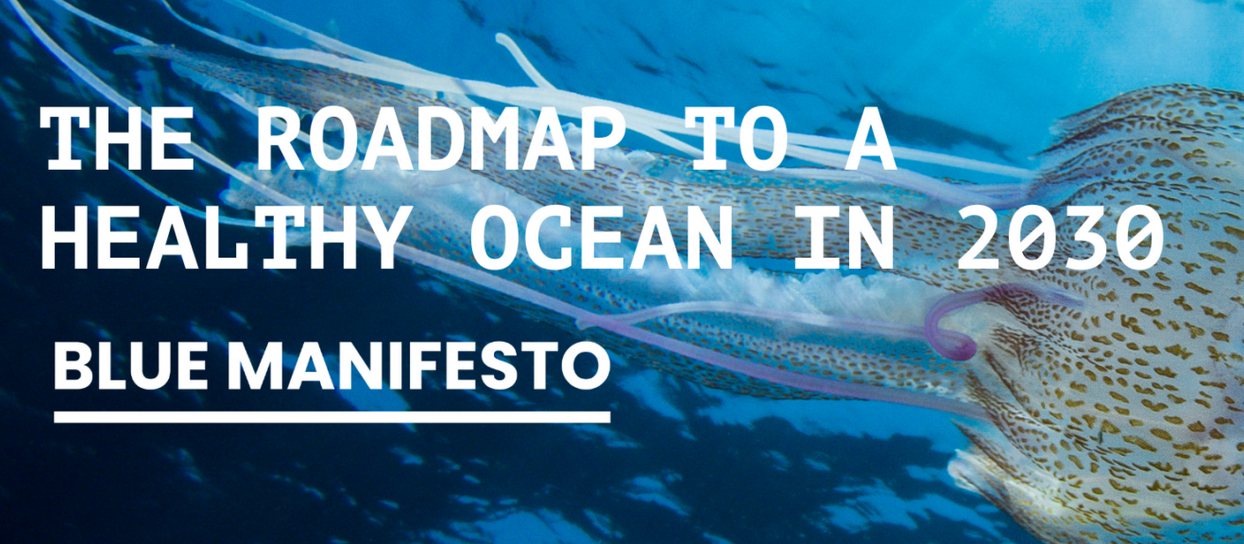140 organisations call on new EU leadership to prioritise ocean health with new fund and ban on destructive activities
With Ocean Week taking the stage this week in Brussels (30 September- 4 October), CCB and other 139 organisations call on the newly elected EU institutions to take a series of bold measures to stop the EU’s ocean and coastlines being pushed to the brink, including launching a Ocean Fund and proposing new legislation to ban destructive activities at sea.

2 October 2024 - Launched at the European Parliament on 1 October, the Blue Manifesto, led by Seas At Risk, BirdLife Europe and Central Asia, ClientEarth, Oceana, Surfrider Foundation Europe and WWF, advocates for an ambitious Ocean Deal that places ocean health at the heart of EU decision-making. It comes after the European Commission president, Ursula von der Leyen, pledged to create a “European Ocean Pact” in July as she was re-appointed for a new term.
According to the European Environment Agency, more than 90% of Europe’s marine area is under pressure from human activities – intensive fishing, shipping, oil and gas drilling, tourism and other coastal activities. Destructive practices such as bottom trawling continue in 90% of EU offshore Marine Protected Areas (MPAs), and more than 14 million tonnes of plastic still enter the ocean each year.
The Blue Manifesto - first launched in 2020 and updated in 2024 - calls on the EU to:
- Use its money more wisely
- Improve ocean governance
- Ensure effective marine protection
- Fight against pollution
- Add the “blue” to the EU’s green just transition
The full document is available in English, French, German and Spanish HERE.
Watch the promotional video:
List of organisations which signed the Blue Manifesto:
Aquatic Life Institute, aquatil gGmbH, Archipelagos Institute of Marine Conservation, ARK Rewilding NL, Art Bakard, Asociación Ambiente Europeo, Associação Bandeira Azul de Ambiente e Educação, Association BIOM, Atlantic Cities, Beyond Plastic Med, BirdLife Malta, BirdLife Sweden, BirdWatch Ireland, BLOOM, Blue Ventures, BLUEBIO ALLIANCE, Blutopia, Bulgarian Biodiversity Foundation, BUND, CAN Europe, Cantine sans plastique France, Center for International Environmental Law (CIEL), CHELONIA, Child Rights International Network (CRIN), City to Sea, Clean Air Action Group, CNCD-11.11.11, Coalition Clean Baltic – CCB, Coastwatch Europe, Compassion in World Farming, Cyclades Preservation Fund, Danmarks Naturfredningsforening, Dansk Ornitologisk Forening (DOF BirdLife), Deep Sea Conservation Coalition, Deutsche Stiftung Meeresschutz, Deutsche Umwelthilfe, Deutscher Naturschutzring (DNR), Doggerland Foundation, Društvo Ekologi brez meja, Eco-Union, ECODES, Ecologistas En Accion – EEA, ECOS (Environmental Coalition on Standards), Electra Energy, Environmental Investigation Agency, Environmental Justice Foundation, Eurogroup for Animals, Europe Jaques Delors, European Environmental Bureau – EEB, European Underwater Federation (EUF), Fauna & Flora, Feedback EU, FishSec, Fondation Tara Océan, Foro Marino Islas Baleares, France Nature Environnement – FNE, Friends of the Earth Cyprus, Friends of the Earth Europe, Fundación Montescola, Fundación Nueva Cultura del Agua, Fundación para la conservación de Ibiza y Formentera, Gallifrey Foundation, Geota, Global Witness, Good Fish, GOOD KARMA PROJECTS, GYBN Europe, Health and Environment Justice Support, Hellenic Ornithological Society (HOS), High Seas Alliance, Iceland Nature Conservation Association, International Fund for Animal Welfare – IFAW, International Peace Information Service (IPIS), Irish Wildlife Trust – IWT, Jesuit European Social Centre, Kelonia-RMR, KYMA sea conservation & research, Lithuanian Ornithological Society (LOD), LookDown Collective, Marilles Foundation, Marine Conservation Society, MATER, MIO-ECSDE, Mundus Maris, Naturskyddsföreningen (Swedish Society for Nature Conservation), Naturvernforbundet, Norwegian Society for The Conservation of Nature, Natuur; Milieu, Natuurpunt, No Plastic In My Sea, North Sea Foundation, Ocean; Climate Platform, Ocean Alive, Ocean Rebellion, Ocean Vision Legal, Ocean. Now! e.V. OceanCare, Oceano Fresco, Oikos – Cooperação e Desenvolvimento, OURZ GmbH, Patagonia, Pestizid Aktions-Netzwerk e.V.,Planet Tracker, Plastic Change, Plastic Soup Foundation, Polish Zero Waste Association, Quercus – Associação Nacional de Conservação da Natureza, Recycle Lebanon, REScoop.eu, Retorna, Sciaena, SDG Watch Europe, Sea First, SEO/BirdLife, SharkGuardian, SharkProject, Stop the Grind, StopFinningEU, Sunce, Sustainable Fisheries and Communities Trust (SFACT), Sustainable Ocean Alliance, SWAN, TransMarTech S-H GmbH, Umanotera, Waddenvereniging, WeMove Europe, Wetlands International Europe, Wetlands International Europe, Whale and Dolphin Conservation – WDC, Women Engage for a Common Future, Worldrise, Youth and Environment Europe (YEE), zeefier, ZERO, Zero Waste Society.


